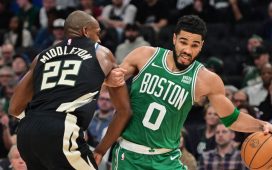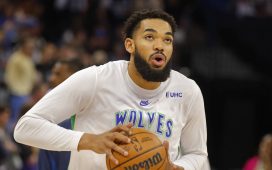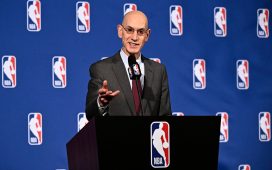Death comes to all of us, famous and unknown, celebrated and ignored, almost always at a time not of our choosing, so there is little to do in preparation other than hope that one is living or has lived a life of meaning and purpose, whether to one person or to millions. Few of us know or can control the impact we have on others; often, it may never be known at all. The teacher whose interest in you changed your life; the friend whose counsel came at exactly the right moment; a relative, a stranger. We honor those who lifted us up; we hope we were there when someone needed us.
It remains unfathomable that these words are typed in reflection of Kobe Bryant’s life, and his death Sunday.
Not just because he was just 41 years old, which is horrific, or because his 13-year-old daughter Gianna was on the helicopter with him, which is shattering.
Not just because he was one of the best to ever play basketball, the sport I know best and with which I am most intimate. Not just because he was charismatic and indefatigable and profane, charming and impossible, insanely curious and difficult. Not because he was his own creation; while he was the son of a former NBA player, Joe (Jellybean) Bryant, he became more, and greater, than his dad had been on the floor. And not just because he was blossoming into his second act, his post-NBA world, one that involved storytelling and creation. There are not many – there are, as far as I know, not any – who have an NBA Most Valuable Player Award, an NBA Finals MVP Award and an Oscar among their possessions.
But because all of that was true. Because he was a loving father, and while neither I, nor you, nor anyone else knows what and how Kobe and Vanessa Bryant felt about one another, after all these years, they were still together raising their children. It is beyond cruel that the very success that Kobe Bryant achieved as an athlete, becoming among the best ever, allowed him the financial wherewithal to be able to take his daughter to her AAU game Sunday in a helicopter, with her teammate and her teammates’ parents, rather than being stuck on the 405 or the 10 or whatever highway was nearest their home, like almost everyone else, cursing the traffic.
Other families were punctured Sunday, including the Altobellis, a name long known in baseball circles. John Altobelli, the longtime baseball coach at Orange Coast College, who’d won more than 700 games there in 27 seasons and who’d coached the likes of Aaron Judge during his career, died in the crash, with his wife and their daughter, who was a teammate of Gianna Bryant’s on that AAU basketball team. Others, including the pilot, perished as well; there were nine people on the helicopter. The loss to those families and those communities is no less wrenching.
But Bryant’s celebrity, of course, makes him the person that most people knew of among those who died.
If he was not the greatest Laker – it is, simply, a matter of preference. Preference for Magic Johnson or Kareem Abdul-Jabbar, who also won five NBA titles, or Wilt Chamberlain, who was the single greatest offensive force in the history of the game, or Shaquille O’Neal, who was the impossible force that teamed with Bryant for the franchise’s ThreePeat (2000-2003), or Elgin Baylor, who was his generation’s Michael Jordan, or Jerry West, who is still the damn Logo. Bryant was, certainly, the Lakers’ most beloved player. When he and Shaq feuded, and Shaq essentially told Jerry Buss to choose, Buss – and 80 to 90 percent of Laker Nation – went with Kobe Bean.
Bryant was this NBA generation’s lodestar, their Jordan, the man they emulated, in admiration of his tenacity and drive and ability to will victories in his team’s direction. He re-branded himself “the Black Mamba” halfway during his career, and it stuck.
“To be honest, I look at Kobe, his mentality,” Bulls guard Kris Dunn said a couple of years ago. “He enjoys that situation. He always wants the ball. I study him a lot when it comes down the stretch, his footwork, being able to get to his spot. Even if the defender knows what spot he’s going to go to, but still be able to get to that spot and still raise up and be able to make the play, that fascinated me. I watch a lot of him.”
It is clear he was not the most efficient of shooters, and this era of advanced statisticians hate Bryant’s numbers. But, as Doug Collins used to say about the greatest players, Bryant put his fingerprints all over games.
“I started playing basketball when I was 16,” Joel Embiid said in 2017, just before the Lakers retired both of Kobe’s jersey numbers, 8 and 24. “And the first time I watched basketball was, I think it was 2009 or 2010. And I was watching the Finals, and it was Kobe and the Lakers against, I think it was Orlando. And they won that series. And that’s how I became, I started liking basketball and I became a Kobe fan. And that’s why I wanted to start playing basketball, but my dad didn’t let me start until 2011. So I feel like Kobe is like the main part. Because just watching that Finals, he just made me want to play basketball. He just made me want to reach this level. So I’m really thankful for him.”
It’s hard to remember, now, that Kobe came into the league, in 1996, straight out of high school, as a disruptor. Years before the SuperFriends in Miami, Bryant had his own Empowerment Era, forming an electric partnership in L.A. with O’Neal. At 18, Bryant made it clear that he had no intention of going to New Jersey, whose Nets salivated at the idea of taking the phenom from Lower Merion High, less than two hours south of Secaucus, with the eighth pick of the first round in the 1996 draft.
Bryant wanted to be in Forum Blue and Gold, and after an electric pre-draft workout for the Lakers that West, then the Lakers’ general manager, called the greatest he’d ever seen, West threw everything behind the effort to get him, with the help of his friend, Arn Tellem – who was, at the time, the most powerful agent in the game. The Lakers traded everyone they could to get the cap room needed to lure Shaq from Orlando, and Tellem bullied the Nets into passing on Bryant’s franchise-shifting potential. (Part of the reason Tellem could bluff New Jersey was that Bryant had spent years of his childhood in Italy, where his father played after the NBA, was fluent in Italian and could credibly threaten to play abroad for a few years.)
And so it came to pass that the man who was, until Saturday night, third all-time in NBA history in scoring, was taken 13th overall in the ’96 draft, by Charlotte, and traded to L.A. for Vlade Divac.
The first time I spoke to Bryant in earnest, for more than just a sound bite after a game, came a few years into his career. The Lakers had just hired Phil Jackson as head coach in 2000. I was at ESPN at the time. My phone rang. It was Tellem. We chitchatted for a couple of minutes, and then he said, ‘Hey, someone wants to talk to you.’
“Who?,” I asked.
“Kobe. He’s sitting right here.”
He wanted to know what Jackson was like. What his practices were like when he was with the Bulls. What did they run? How did they do it? How smart was he? I answered the best I could, but I had the sense that he already knew most of the answers already, and he was just checking his work, like the kid who took 20 minutes on the trig exam it took everyone else an hour to finish.
Famously, he won big, and clashed big, with both O’Neal and Jackson, as the trio led the Lakers to three straight championships, while they were cussin’ and fussin’ at one another. Kobe’s coming out party really was against Indiana in the 2000 Finals, in Game 4; after Shaq fouled out, Kobe scored six straight in OT to lead the Lakers to the series-altering victory, leaving them up 3-1 in a series they would ultimately win in six games. Bryant said afterward that he’d dreamed of that moment. From that moment on, he was essentially unstoppable, as he and Shaq ran through the opposition.

Andrew D. Bernstein / Getty Images
So many alleged “Kobe stoppers” fell by the wayside over the years: Derek Anderson and Ruben Patterson; Raja Bell and Bruce Bowen. Michael Lewis, of “Moneyball” and “The Blind Side” fame, devoted a huge takeout in The New York Times Magazine to Shane Battier’s meticulous preparations while playing in Houston to try to keep Bryant in check. The moral, after thousands of words and dozens of interviews?
Hope he misses.
Kobe said that Tony Allen was the toughest guy for him to figure out. For Allen, a three-time NBA first-team all-defense selection, the feeling was mutual.
“I learned my lesson my rookie year (2004, in Boston), when I was talking to him,” Allen said. “He fouled me out in like seven or eight minutes. From that point on, I knew I couldn’t talk to him. He was kind of buttering me up. He’s asking me where am I from, how you doing young fella, where you from, I like your heart, young fella. Before you know it he’s head faked you three times and got the and one off the backboard, came off the pick and roll and dunked on you.”
His mental toughness was unparalleled; his offseason practice habits became the stuff of legend. The “Mamba Mentality” that became his brand was rooted in real things – brutal workouts that left others gasping, relentless film study, consistently testing teammates to see if they could handle the furnace of elite competition.
He could be exasperating. He didn’t speak to me for more than a year after I (correctly) reported that he’d gotten into a postgame verbal altercation with Lamar Odom, which nearly turned physical, after Odom had blown an assignment at the end of a game with the woeful Wizards that led to an unlikely Lakers defeat early in 2002. I had the info cold, in part because Bryant had confirmed it himself, as he walked out of the visiting locker room. I guess he thought I was going to keep that to myself. But that’s why I’d asked him about it in the first place. When his people demanded a retraction, I refused; how could I retract something about him that he himself said was true?
And he could be stubborn, as when I watched, in shock, from courtside, as he took just three shots in the second half of Game 7 of the Lakers’ first-round series with Phoenix, a game they wound up losing by 28. In the subsequent years Bryant said he was merely trying to do what Jackson wanted, to get everyone else involved. But Kobe could no more watch a game slip away without him doing something to stop it as you could stop water from flowing through your fingers.
Soon after that season, Kobe asked for, then retracted, a trade demand. It was not the first time he looked to leave L.A.; he’d done so as well in 2001, though that one wasn’t public; he wanted to be traded to the Wizards, who were being run at the time by Michael Jordan; this was before Jordan had decided to return to playing. But Washington’s roster was unimaginably bad at that moment; the Wizards couldn’t have made an offer to L.A. that wouldn’t have been laughed out of Mitch Kupchak’s office.
But he could also be delightful. He told incredibly funny stories, including one about one of baseball’s all-time best players, with whom he’d spent some time and who he found to be an incredible phony. He performed hundreds (thousands?) of acts of kindness, to teammates and complete strangers, that almost no one knew about. And he would light up when you asked about his kids, genuinely. It wasn’t an act or a role; it was joy in fatherhood, which you know when you become one yourself.
I have not forgotten about what happened in Eagle, Colorado, in 2003. No summary of Bryant’s life can be complete without it. He was accused of rape by an employee of a resort hotel. Bryant acknowledged the adultery, but said the sex between him and the woman was consensual. After months of pre-trial motions, but also after unceasing pressure by Bryant’s attorneys and the disclosure of the woman’s name to media outlets, she dropped criminal charges against Bryant in 2004. Bryant, though, publicly apologized to the woman in a statement that year. (The woman ultimately also agreed to settle a civil lawsuit against Bryant in 2005. )
“Although I truly believe this encounter between us was consensual, I recognize now that she did not and does not view this incident the same way I did,” Bryant said in the statement. “After months of reviewing discovery, listening to her attorney, and even her testimony in person, I now understand how she feels that she did not consent to this encounter.” (This L.A. Times story from 2005 provides a detailed summary of the cases.)
It would be horrendous to speak of that case from Bryant’s perspective, in terms of what he “learned” or some other such nonsense, because it wasn’t about how it affected him; it was about how it affected the woman. It is best, simply, to say his career continued, and after O’Neal’s departure and a couple of years in the wilderness (the name “Smush Parker” comes to mind here), the Lakers built another championship team around Bryant, trading for Pau Gasol in 2008 and bringing in vets like Derek Fisher and Metta World Peace. And Bryant again became a champion, winning two more rings, in 2009 and 2010, to give him five for his career. There would be no sixth, leaving Bryant one short of Jordan.
There were fits and starts afterward, as the Lakers flailed and failed at keeping up with the rest of the west, gambling on aging stars like Steve Nash and Dwight Howard, and losing. Mostly, there were injuries, with the 2013 Achilles’ tear the beginning of the end.
It was notable not just for Bryant’s attempts to roll the torn tendon back into place, or to ask head athletic trainer Gary Vitti if there was some way he could tape it up and keep playing. It was notable, of course, because Bryant insisted on shooting the two free throws owed him after he was fouled and crashed to the floor, then insisted on leaving the floor on his own after L.A. took a deliberate foul to get him off the court.

Noah Graham / Getty Images
“I told the officials what we were going to do,” Vitti recalled in 2017. “As soon as we fouled, I walked out on the court to get him. And I said, ‘You want a chair?’ And he said, ‘No, I’m walking off.’ And he walked all the way back to the training room on his own power. That was a message to Paul Pierce. ‘Cause you remember in the (2008) Finals, Pierce looked like he got shot by a sniper, rolling around, writhing in pain? They take him off on a chair and he comes back and plays and they beat us? That was Kobe’s fuck you to Paul Pierce.”
He faced the end of his career, on a team full of kids that he no longer had the skill or will to lift up, with aplomb.
“There’s so much beauty in the pain of this thing,” he told me in 2015. “It sounds really weird to say that. But I appreciate the really, really tough times as much as I appreciate the great times. It’s important to go through that progression. Because that’s when you really learn about yourself.”
Was he rationalizing the very mediocrity he would have destroyed in his earlier days? Perhaps. This happens. But the months that followed his retirement were filled with portent and promise.
The Oscar came in 2018, for Best Animated Short Film, an adaptation of his “Dear Basketball” letter he’d written in The Players Tribune. He formed Granity Studios to produce and create original content – books, podcasts, animation – designed around life lessons young adults and kids learn through participation in sports. He stayed connected to actual young athletes with the Mamba Academy, the 100,000-square foot behemoth in Thousand Oaks. He was, it seemed, ready to connect with the next generation of athletes, the sons and daughters of so many that had his posters on their walls, his videos on their phones and iPads, his adult life available to them via social media.
To not know what Kobe Bryant’s next moves would have been, what he envisioned in his mind and set to make real in the world, hurts immensely. All of these last 24 hours have hurt, immensely. And there is no understanding, no solace, and there won’t be for a very long time. There is just numbness and pain, and heartbreak, and tears, so many tears.
Read more Kobe Bryant coverage on this topic page
(Top photo: Nathaniel S Butler / via Getty Images)






